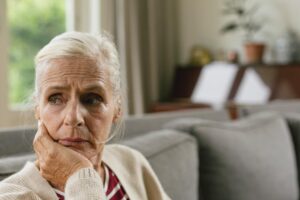 Older adults may be at risk for post-traumatic stress disorder (PTSD) following a severe fall.
Older adults may be at risk for post-traumatic stress disorder (PTSD) following a severe fall.
As seniors age, the likelihood of falling and severely injuring themselves grows. Falls can result in serious injury and are the leading cause of fractures in older adults. But falling may have even more severe psychological implications for some seniors.
If you or a loved one has suffered from a fall, it is important to consider enrolling them in a PTSD treatment center. The Ranch Tennessee can help to provide the PTSD therapy and treatment that seniors need to overcome their trauma and regain a sense of independence from their past injuries. Reach out today at 1.844.876.7680 to learn more.
PTSD Symptoms, Personal History
According to research from the department of psychiatry at Weill Cornell Medical College in New York, 27 seniors out of a group of 100 had symptoms of PTSD after falling.1 The 100 seniors were over 65, and each had been admitted to the hospital after a fall. Falling is a serious issue for older adults. More than 1.6 million seniors are hospitalized in the United States each year after a fall.
Understanding Symptoms of PTSD in Adults
If future research confirms the findings of this study, it will help to expand our understanding of the types of experiences that can be genuinely traumatic and lead to symptoms of PTSD. While a fall may not seem like an event that could lead to a psychological disorder, these results show that PTSD may affect a broader range of people than previously realized. These results also emphasize how serious a fall can be for an older adult, highlighting the fears many seniors have about falling and the possible physical and psychological effects.
Some of the most common symptoms of PTSD include:
- Nightmares or flashbacks
- Intense feelings of fear, anxiety, or guilt
- Difficulty remembering what happened during and after the fall
- Avoiding talking about the incident or anything related to it
- Feeling isolated from friends and family members since the fall occurred
Treating PTSD At Promises Recovery Ranch TN
Treatment centers can be an important resource for older adults who have fallen and developed PTSD. They can offer a variety of services that can help people manage their symptoms and recover from the trauma. Some of the services provided by our treatment center include:
- Individual therapy – This is a one-on-one session with a therapist specializing in PTSD. The therapist will work with the person to help them understand and cope with their symptoms.
- Group therapy – This is a therapy session where people meet in a group setting to discuss their experiences and learn from each other. Group therapy can be helpful for people who feel embarrassed or ashamed about their symptoms.
- Family therapy – This is a therapy session where the family members of the person with PTSD can discuss how the disorder has affected them. Family therapy can help family members understand and support the person with PTSD.
- Medication – Some people with PTSD may benefit from medication to help manage their symptoms. Medications that are commonly prescribed for PTSD include antidepressants and anti-anxiety medications.
- Education – Treatment centers often provide education about PTSD to help people understand what it is and how to manage it. Education can also help family members and friends better support the person with PTSD.
Get Help At Promises Recovery Ranch TN
At Promises Recovery Ranch TN, our team specializes in providing high-level PTSD treatment plans that help to get o the root of PTSD so your loved ones can recover from their traumatic experience.
If you or a loved one is struggling with PTSD after a fall, contact us today at 1.844.876.7680 to learn more about our treatment programs. We can help you find the support and resources you need to recover.
1. National Library of Medicine – “Post-traumatic stress symptoms in older adults hospitalized for fall injury.”
